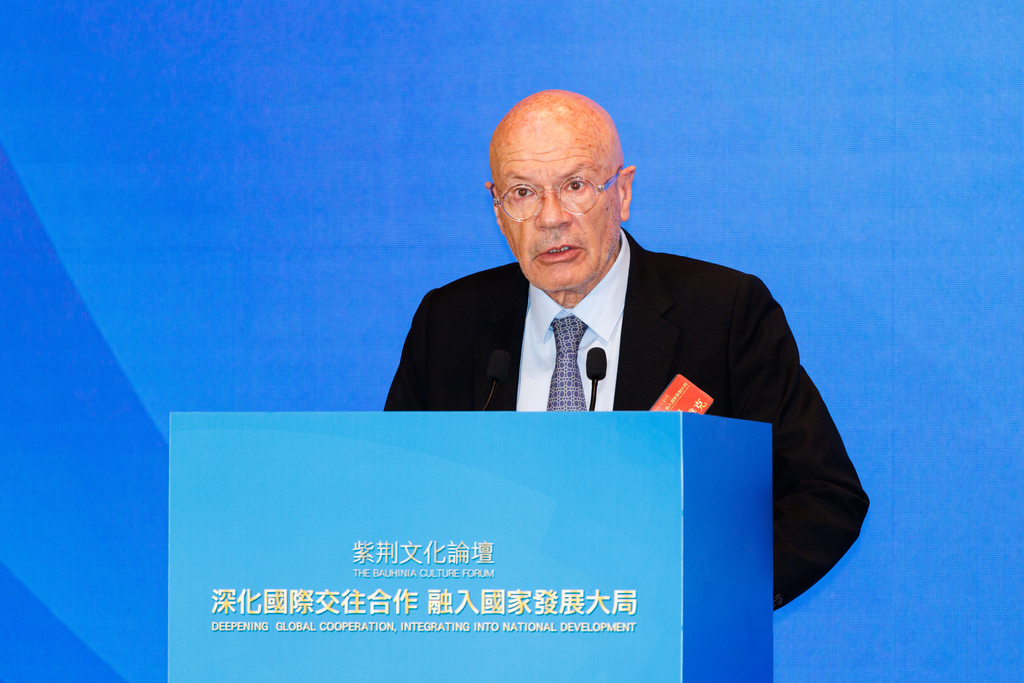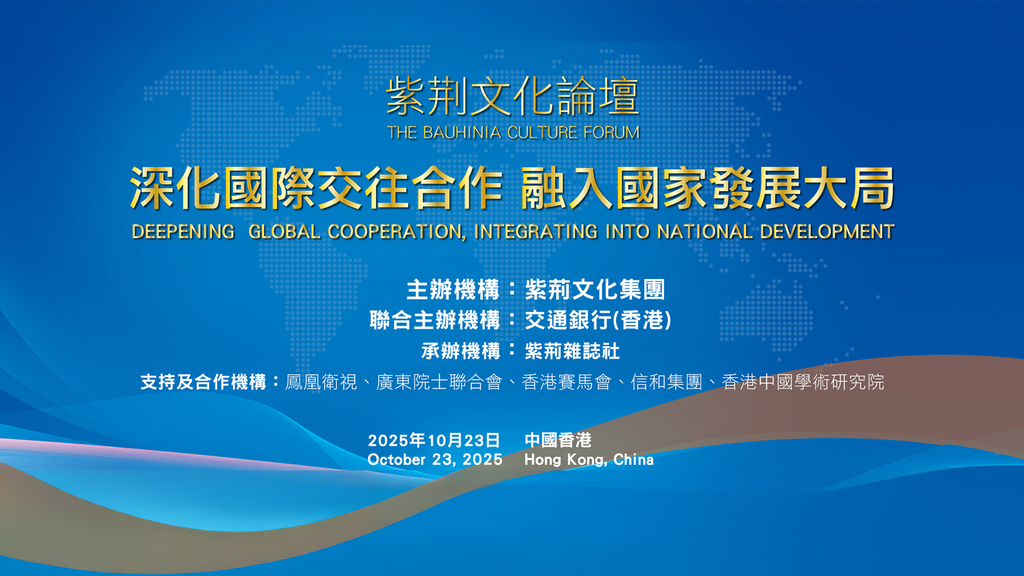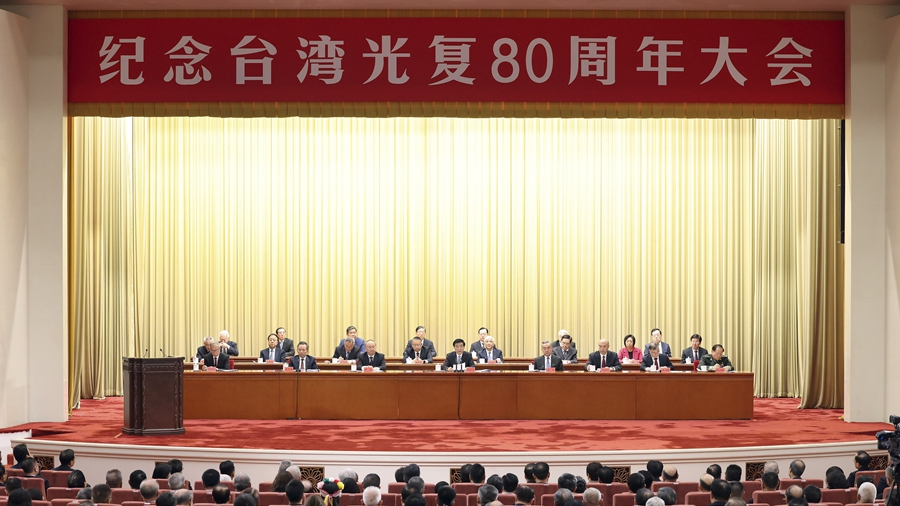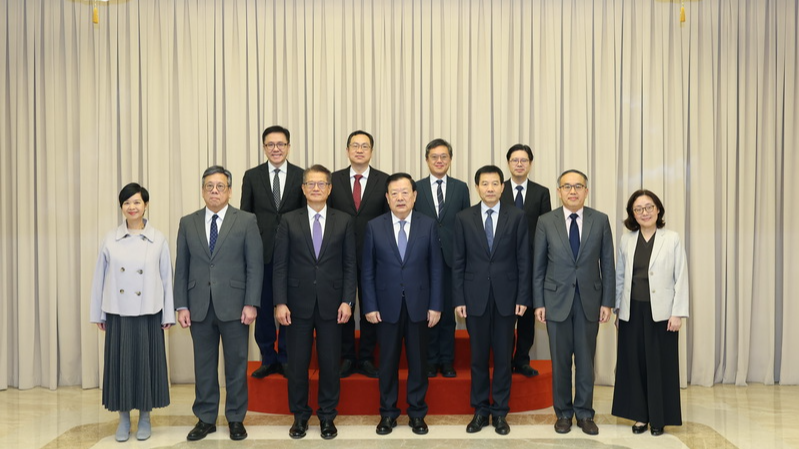On October 23, Martin Jacques, former senior research fellow at the University of Cambridge, delivered a keynote speech at the 2025 Bauhinia Cultural Forum. The following is the full text of his speech:
By Martin Jacques

By way of introduction, I lived in Hong Kong from November 1998 to March 2001. It was here that I started my research for my now famous book ‘When China Rules the World’. From long before I was a very strong supporter of One Country Two Systems. My wife and I came to Hong Kong specially for the handover in 1997. Subsequently, living here, there were important aspects of Hong Kong that I felt uneasy about: its colonial feel and legacy; its sense of hubris; the bigotry towards those from the mainland; and the discriminatory attitude towards ethnic minorities. My wife was Indian Malaysian, a top-class lawyer, her life in Hong Kong was blighted by the everyday racism she experienced on the streets, in restaurants, at work, everywhere, even in hospitals; she died in one because of medical negligence and racial discrimination. The most terrible day of my life.
I think Hong Kong now has a golden opportunity to think afresh and reinvent itself. Rather than regretting the events of the recent past in 2019-20, Hong Kong should embrace a very different and new kind of future.
I would like to make seven propositions concerning Hong Kong’s future.
It must be based on deep integration with the Greater Bay Area. The dynamism of Guangdong and its cities, represents a huge opportunity for Hong Kong which it must embrace in the fullest possible way. When I lived here, such thinking was still somewhat reluctant, with many looking down on Guangdong as Hong Kong’s inferior. If anything, the opposite was in fact the case. Now I think that commitment is full-hearted. This is of fundamental importance.
Hong Kong has the great fortune to be part of China, a country which has not only has transformed itself, but is now transforming the world. More and more people, especially in the Global South, look to China as the new global leader, the world’s largest economy, the biggest contributor to global economic growth, the leader of the green transition, the de facto leader of the Global South. I could go on. It was Hong Kong’s huge good fortune in 1997, in the midst of China’s rise, to become part of China and bring to an end 156 years of British colonial rule. China embraces and embodies the future; Britain, my own country, lives in the past and is afraid of the future. Hong Kong got lucky.
A major task for the HK government, everyone indeed, is to create a new sense of belonging amongst Hong Kong people. A new sense of pride in a new HK. HK as part of the GBA; HK as part of China; HK as part of East Asia. A new sense of identity which is inclusive not exclusive, that embraces mainlanders and the Cantonese, that treats those from elsewhere who have chosen to live here whether permanently or temporarily, be they Indonesian, Filipino, Indian or whatever, as an integral part of HK’s new cosmopolitan identity. This is a responsibility of everyone. If successful, HK will be in the forefront of progressive global cultural change. A new identity for a changing world. Think of China’s Global Civilization Initiative in this context, which is a wonderful statement in praise of diversity.
Hong Kong should take every opportunity to develop closer relations with its neighbours in ASEAN. Together these constitute one of the most dynamic regions of the world, with a population of over 700 million, a growth rate of around 4-5%, and which are drawing ever closer to China. Hong Kong’s role as a highly competent and dynamic financial centre could become a major resource for these countries. The internationalisation of the renminbi could offer major opportunities for Hong Kong financial sector in the ASEAN countries.
It seems likely, at least for the foreseeable future, that Western countries and institutions will be much less involved with Hong Kong as a financial centre. This should not be seen as a reason for regret, but rather as an opportunity for Hong Kong’s financial institutions to develop a much closer relationship with those parts of the world that it previously neglected or largely ignored, the countries of the Global South, home to roughly 70% of the world’s population, excluding China. The Belt and Road countries could offer Hong Kong’s financial institutions many diverse opportunities. But such connections will require a new kind of business and operating model. And the fees are likely to be much more modest than those of the West. Such work and such connections will demand a very different mind-set and culture compared with Wall Street, London or wherever. But, together with China, this is where the future of the Hong Kong financial sector surely lies.
Hong Kong needs to develop a new mental map. Prior to the handover and, to a much lesser extent even until 2020, Hong Kong looked westwards to North America and Europe. It looked increasingly to China after the handover but not, until much more recently, to the Global South and ASEAN. Since Trump’s election in 2016, and especially since 2024, relations between China and the United States have steadily worsened. Most likely this will continue for at least another decade, probably longer. As the process of decoupling between the US and China continues, it is likely that the world will become more balkanised, with a US bloc and a China/Belt and Road bloc. This needs to inform the way that Hong Kong and its institutions think about the future: don’t think Western, think China and Global South. That is where HK’s future lies for the indefinite future. Hong Kong needs to develop a new generation of leaders who think like this, who think China and think Global South. Schools, universities, business schools, and think-tanks must play a major role in this.
Although Hong Kong has long been associated with modernity, notably because of the extraordinary skyline of Hong Kong island, its financial sector, transportation system and living standards, this is no longer as true as it was. It is certainly a long time since Hong Kong was associated with cultural modernity, most famously the creativity of its film industry. Modernity is no longer just about economics; it is also increasingly about culture. This is an area which Hong Kong needs to give serious attention to. It has fallen behind; think of Japanese anime, South Korean K-pop culture. China is fast developing a powerful new cultural modernity across many fields, from film and fashion to architecture and street culture. If Hong Kong wants to develop a new identity, as I have argued, an imaginative and dynamic culture is a crucial aspect of this. How? There are many possibilities. I was very struck by a recent article in the South China Morning Post which argued that the Northern Metropolis should not be seen narrowly in terms of property (a repeat of Hong Kong’s bad old ways!), but as a great new cultural opportunity. Think like this. The Northern Metropolis in ten years or so increasingly becomes a hotbed of cultural creativity in music, dress, film, street theatre, a Tencent entertainment park with gaming at its heart, new lifestyles, linguistic innovation, and ethnic diversity. Famous across the world. It could be. But it will require a very different kind of thinking and mind-set from a new young generation.
Thank you.
(The author is Former Senior Fellow at the Department of Politics and International Studies, Cambridge University.The views do not necessarily reflect those of Bauhinia Magazine.)







 今日热搜
今日热搜

 本周热搜
本周热搜

 本月热搜
本月热搜










 查看更多
查看更多















